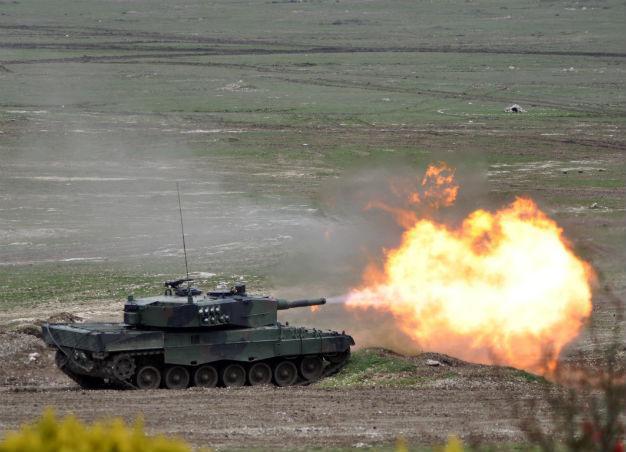Turkish fire targets ISIL bomber’s town
WASHINGTON / ISTANBUL

A spokesperson for the U.S.-led coalition against the Islamic State of Iraq and the Levant (ISIL) has confirmed that Turkish artillery strikes are firing on an area in Syria known as the hometown of the suicide bomber who killed 10 people in Istanbul’s historic Sultanahmet Square on Jan. 12.
“We’ve seen the Turks fire some artillery to very good effect in the Manbij pocket,” said Operation Inherent Resolve Spokesman Colonel Steve Warren on Jan. 12 via teleconference connecting from Baghdad.
“We’re continuing to work with the Turks to tighten up our coordination with them on the artillery strikes they do in that area, but yes they are targeting,” Warren added.
Manbij is located near Turkey’s southern border with Syria and has been determined as the home village of 28-year-old Nabil Fadli, the ISIL suicide bomber who detonated himself in Istanbul’s most touristic spot on Jan. 12 and killed 10 German tourists.
Manbij is where the Fadli family live, according to a report in The Times newspaper. Fadli lived with his family in Saudi Arabia until he was eight-years-old and then moved to Damascus. From the Syrian capital, the family later moved to Manbij, which is located around 30-kilometers from both the Turkish border to the north and the Euphrates River to the east.
The British newspaper also reported that Fadli was among the first people to join ISIL after the town was captured by the jihadist group.
The area around Manbij is known as the Manbij pocket, on which Warren said Turkey was conducting artillery strikes.
The area is of strategic importance to Turkey, as it does not want the Democratic Union Party (PYD), which Ankara sees as an extension of the outlawed Kurdistan Workers’ Party (PKK) in Syria, to cross to the west of the Euphrates. Ankara has marked this as its “redline” and had previously expressed concerns to the U.S. over Syrian Kurdish groups’ attempts to create a “Kurdish corridor” in northern Syria and change the demographic structure of the region to the advantage of Kurds.
Commenting on improving the coordination between the Turkish forces and anti-ISIL coalition, Warren said they wanted to know more accurately where the Turkish artillery would be hitting beforehand.
“We want to ensure that we know exactly where they’re [Turks] going to strike before they strike. This is always the case in any type of a large outfit with as many moving parts as we have in this coalition,” he said.
“There were some weather problems. We were having difficulty providing the type of air power we wanted to provide, and the Turks filled in with artillery fire. So it was perfect. It happened the way it was supposed to happen,” Warren added.
Hours before he spoke, Prime Minister Ahmet Davutoğlu said Turkey had killed 200 ISIL militants in cross-border operations over the past 48 hours, during which Turkey fired 500 cannon shots at ISIL targets in Iraq and Syria.
Warren described the fight as “a First World War-style situation.”
“You’ve got trench lines, bunkers, berms, and it’s a fairly static fight right now. There is tremendous tactical ferocity in certain small spots. They’ll battle heavily over feet or even inches,” he said.
The head of the U.S. Central Command also commended Turkey’s effort to seal its border in order to prevent the flow of foreign fighters, noting the tough fight in northern Syria between ISIL and opposition groups.
Gen. Lloyd Austin said Turkey, in cooperation with U.S. forces, had significantly slowed the flow of foreign fighters, state-run Anadolu Agency reported.
Austin was speaking during a press conference alongside U.S. Defense Secretary Ash Carter in Tampa, Florida, where the general’s retirement was announced.
Carter said Austin will soon leave and U.S. President Barack Obama will nominate Special Operations Command Chief Joseph Votel to head Central Command.
 A spokesperson for the U.S.-led coalition against the Islamic State of Iraq and the Levant (ISIL) has confirmed that Turkish artillery strikes are firing on an area in Syria known as the hometown of the suicide bomber who killed 10 people in Istanbul’s historic Sultanahmet Square on Jan. 12.
A spokesperson for the U.S.-led coalition against the Islamic State of Iraq and the Levant (ISIL) has confirmed that Turkish artillery strikes are firing on an area in Syria known as the hometown of the suicide bomber who killed 10 people in Istanbul’s historic Sultanahmet Square on Jan. 12.